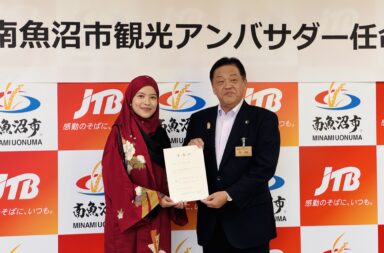Frequently Asked Question; Maternity in Japan
We summarize frequently asked questions regarding maternity in Japan that Muslim residents often ask. We hope this will help Muslim residents clear out curiosity and doubt.
※The answers are summarized according to experience and advice from our Muslim staff who was going through pregnancy and delivery in Japan.
※Please use it as a reference and do decide at your discretion.
※This is NOT doctor/expert advice. For detailed information on medical treatment, please do check with your doctor.
※The list will be updated regularly.
Hospital and Check-Ups
I can’t speak Japanese. How can I find a hospital that can communicate in English?
A few hospitals in big cities like Tokyo and Osaka are English-speaking. However, if there is no such hospital close to you, you can use a medical interpreter or use translator application/software on your phone.
The medical translation service application
Android iPhone
Muslim hospital yubisashi
I feel embarrassed if being checked by a male doctor but it’s quite difficult to find a hospital/clinic with female obstetrics and gynecology doctor.
Most obstetrics and gynecology doctors are male, not only in Japan but also in countries, and in fact, it is quite difficult to find female doctors. There are a few hospitals with female doctors but since there are a couple of doctors at the same hospital, most time you will face different doctors in each check-up. It is back to your principles, you may allow yourself to be checked by a male doctor since it is medical-related stuff, or if you can’t accept it, by all means, you may consult the hospital to specify the doctor in charge for you (on the other hand, you may need to wait longer for your turn to be checked).
Why do we need to have a pelvic examination? Is it common?It’s embarrassing.
It is common to have a pelvic examination, especially in the first trimester (about until 4 months of pregnancy) in Japan. It is called naishin (内診). It is quite hard to get through because there is no such examination, besides echo, in most Muslim-majority countries.
Naishin examination allows the doctor to check the fetus accurately because the tools can reach as close as possible to the uterus and it is a common check-up in Japan.
I was asked to come again to the hospital next week for blood sampling. Is it common in Japan? Does it have any relation to the pregnancy?
Yes, it is also a common check-up procedure. You will be asked for blood sampling about 2 times, in the first and last trimester to examine disease that might influence the pregnancy such as high blood pressure and diabetes. If you have such a disease, you will get through different treatments to make sure you and the baby safe.
Most hospitals/clinics will ask you to not eating or drinking (besides water) at least 2 hours before taking the sampling.
Besides blood sampling, most hospitals/clinics will ask for urine sampling, measure the body weight, and measure the blood pressure in each check-up.
Is the pregnancy check-up fee covered by health insurance?
No, because pregnancy does not a disease, means you need to pay all the bill by yourself. However, you will get check-up vouchers (for 14 times check-ups, because you will get through 14 check-ups in total until delivery) together with the mother and child handbook. The voucher allows you to pay way cheaper (like 500 yen, 1,000 yen or so).
I’ve been asked by the hospital to sign some documents. Is it common?
Yes, there are some documents that you need to sign ;
・Delivery reservation application (may be submitted together with the reservation fee)
→ This is an application to book the hospital for delivery, you will need to decide where you will deliver since the 12 weeks of pregnancy or so. There are some cases you can’t book a room/hospital for delivery if you don’t make a reservation in advance. It is because the hospital needs to do the preparation and there is a chance of no vacant room.
・Approval application to let a doctor do medical practice needed during delivery.
→ If you or the baby is in an urgent condition during the delivery, the doctor will be allowed to do super quick action in medical practice to save you and the baby without bothering in asking the family and waiting for the reply/approval, since a second is extremely important in saving your and the baby’s life.
・Insurance application
→ This is an application to cover the cost if something happens to the baby on the delivery.
・Hospitalization pledge (入院誓約書)
→ This is an application to get hospitalized. In the application, it may differ in each hospital/clinic though, you will be needed to fill in your information before you will be able to get hospitalized. You also can fill in the religion and allergies information.
・Payment application
→ In some cases, the application will be given together with the hospitalization pledge. In the application, you will need someone to be your guarantee in paying the hospital fee. Yes, Japan will cover 420,000 yen, but mostly you will need to pay the excess fee, that’s why you will be asked to fill in and sign the application.
Pregnancy
What is “boshitecho”? When and where I can get it?
Boshitecho means “mother and child handbook”. In Japan, expectant mothers are given a booklet for recording their health condition and important information regarding childbirth such as the date and where the baby was born. This booklet is also used to log records of the child’s vaccinations and growth. Once the fetus’s heartbeat is strong enough, your doctor will ask you to get the boshitecho in your nearest city hall in exchange for the pregnancy notification you need to submit to the city hall. You will not get the book without instruction from the doctor.
Where I can find information about pregnancy, delivery, etc in Japan?
Most of the information is in Japanese. There are some maternity magazines issued once a month with the latest information and guidance about maternity and parenting. Some city halls also issue related booklets.
How to overcome morning sickness?
According to the doctor’s advice we got, you don’t need to push yourself to eat or drink if you feel unwell. Eat or drink something that your body can accept. Most of the pregnant women that facing morning sickness feel better if they drink soda, some if they eat fruits. Find what is best for your body.
Should I change my skincare during pregnancy?
It is back to you if you’ve been told by your doctor. In common, there is no need to change your skincare, but some people may have sensitive skin when they are getting pregnant. If so, you can change your skincare into those for sensitive skin. Or if you feel doubt, you can change your skincare to the all-natural one.
I’ve been requested to be careful to manage my weight, why?
Most doctors will ask you to manage your body weight during pregnancy according to your BMI. It is to prevent too much fat in the birth canal which led to hard labor.
Bodyweight guidance :
BMI <18.5 = 9-12 kg
BMI 18.5~25 = 7-12 kg
BMI 25> = need to consult to doctor
Is it okay to drink coffee during pregnancy?
Caffeine can affect both mother and baby, it is highly recommended to have the caffeine-less (or non-caffeine) coffee to go. However, according to the WHO, a pregnant woman can have up to 3-4 cups a day, meanwhile, Kanada’s Ministry of Public Health mentioned 300 gr/day (about 2,5 cups of 200ml cup), and the British Food Standards Agency mentioned 200mg/day (about 1,7 cups of 200ml cup).
Source: https://woman.mynavi.jp/kosodate/articles/1277
Is there anything I have to pay attention to during pregnancy or delivery?
・Do confirm in advance to the hospital about food it can serve during hospitalization and ingredients of baby’s milk formula
・Make sure to book the hospital for delivery
・Most hospital does not allow a family member to stay all day with you and it is common in Japan. You do everything by yourself even during hospitalization.
Delivery
I don’t know what to prepare for the delivery and baby birth.
Most hospitals/clinics, also city hall, hold a mother class. They will let you know what to prepare and bring. In standard, you will be asked to bring sanjoku pants (産褥ショーツ), nursing bra, front-opening pajama, and pelvic belt (骨盤ベルト) which you will use right after delivery.
For the baby stuff, you need to adjust it with the season. Baby store in Japan changes products displayed to those suitable for the upcoming season and most of the baby store’s staff will happily guide you to choose what to prepare.
Does it common to have a normal delivery in Japan?
Yes, normal delivery is common in Japan. Even you have some trouble like a breech baby, the doctor will help and give you instructions to have a normal delivery. In Japan, there are movements to fix the baby’s position to normal.
The Caesarean section will be allowed only if any emergency.
I have high myopia and I have heard that normal delivery can cause blindness. What should I do?
According to information from doctors, there is no such thing, you still able to have a normal delivery even with high myopia. In Japan, you will be taught techniques in pushing.
However, if you have a thin retina (need to check with ophthalmologists), you might need to have a Caesarean section.
I heard the delivery fee is extremely expensive in Japan. How much it takes?
Japanese government covers 420,000 yen per baby. This also applies to foreign residents. Depends on your hospitalized fee and services during hospitalization, you might need to pay the excess fee, range from 50,000 yen to 200,000 yen.
I heard that there is a delivery way called “mutsuu bunben”, what is it?
It is a delivery way where you will get anesthesia to reduce pain. The anesthesia will be injected into your back. There are individual differences, some feel no pain at all, some not. Even so, you can feel the wave of labor pain, that allows you to know the timing to push.
If you have any questions regarding maternity in Japan, feel free to inquire to Halal Media Japan Facebook and Instagram or to our Muslim staff’s Facebook and Instagram or email to [info@food-diversity.co.jp].


